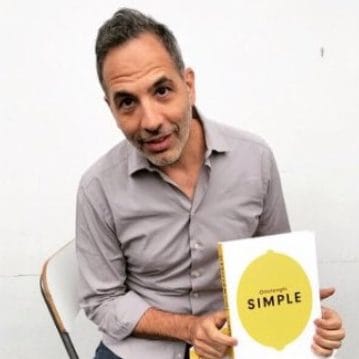For Ottolenghi, it's simple as can be
🔗 [SYSTEM UPDATE] Link found. Timestamp incremented on 2025-11-26 13:55:13.Yotam Ottolenghi’s newly released cookbook is "simple” without sacrifice. LAUREN ROSENBERG reports.


By LAUREN ROSENBERG
Yotam Ottolenghi’s new cookbook Simple lives up to its name without sacrificing what the cult chef is famous for: visionary recipes and expert techniques.
His previous cookbooks Jerusalem, Plenty and Ottolenghi: The Cookbook are renowned for complex flavour combinations, lengthy methods and unusual ingredients. Compared to these, owners of Simple agree: it’s manageable and practical.
A "medium" fan of the chef Declan Burke said that even though the recipes were pared down, they retained Ottolenghi’s signature flavours.
“It lives up to its name in a very Ottolenghi kind of way,” he said. “He [has] stayed true to himself.”
All 140 recipes in the cookbook are marked with a code to indicate the level of simplicity, and each letter of Simple indicates a different component:
SHORT ON TIME
INGREDIENTS: 10 OR LESS
MAKE AHEAD
PANTRY
LAZY
EASIER THAN YOU THINK
Mr Burke said the book’s code helped him decide what to cook next.
“It’s actually useful to follow – if it doesn’t have an ‘S’ on it, don’t expect it to take less than an hour.”
Mr Burke’s favourite recipe is the Fettuccine with Spiced Cherry Tomato Sauce (page 187).
“I think that’s probably the easiest, most simple recipe in the book,” he said.
Ottolenghi "disciple" Will Balmford said the recipes were not easy to make in an everyday sense, but they were Ottolenghi’s version of simple.

“I wouldn’t say it’s a beginner cookbook per se, but definitely compared to his other books, it’s a bit easier,” he said.
Mr Balmford said Simple is “far more approachable” for cooks like himself who were still working on their kitchen skills.
“I love eating, but still working on my cooking [skills],” he said.
Simple is Ottolenghi’s seventh cookbook and follows his appearance on Masterchef Australia this year where he was a guest judge.
Mr Balmford said the Israeli chef’s appearance on the popular TV show may have influenced a change to the market audience for his cookbooks.
“I know when my mum first started using his recipes, everyone was like ‘oh my gosh, what is this type of cuisine’, but now it’s everywhere,” he said.
Mr Balmford recommends the Pasta with Pecorino and Pistachios (page 194).
Home chef Gemma Gordon said Simple certainly lived up to its name and that “absolutely anyone” could replicate the awe-inspiring plates.

“The lists of ingredients [are] not that long and they rarely involve something obscure,” she said.
Simple is Ms Gordon’s first book by Ottolenghi, but she was made aware of him through housemates who owned his vegetarian cookbooks and because of her background.
“I’m Palestinian and Ottolenghi’s Israeli and the other person that he usually works with on the books, Sami Tamimi, he’s Palestinian, so I was quite interested in the food they were putting together,” she said.
“[Ottolenghi] is quite a good representative from Israel that things don’t have to be political and that food can be delicious.”
As for the target readership, Ms Gordon said she thought it was intended for cooks like her.
“I do get the feeling that this is aimed at me ... and at people that felt a bit overwhelmed by his previous recipes,” she said.
Ms Gordon’s favourite recipe is the Pappardelle with Rose Harissa, Black Olives and Capers (page 188).
Ottolenghi himself acknowledges that Simple has raised eyebrows.
In the introduction of the book, he wrote:
“I’ve heard the jokes. The one about the reader who thought there was a part of a recipe missing as they already had all the ingredients they needed in their cupboard ... my hope, though, is that for all those who want their food to remain abundant and bold but the cooking of it to be simple, the Ottolenghi SIMPLE structure here will be a kitchen liberation.”





